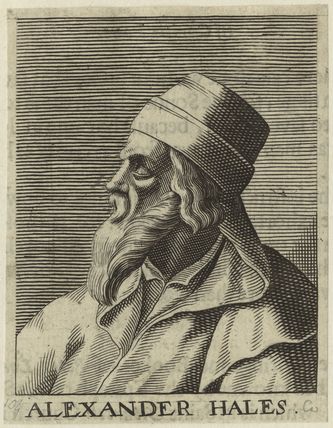
The Franciscan Fr. Alexander of Hales (+1245) has been called the Doctor Doctorum because he was the Master and Professor of the likes of St. Thomas Aquinas and St. Bonaventure during his time at the University of Paris. He was also called the Doctor Irrefragibilis by Pope Alexander IV in the Bull De Fontibus Paradisi, as well as the Theologorum Monarcha. Obviously St. Thomas did not find him “irrefutable” since he uses Fr. Alexander’s argument of Good being diffusive of itself as a reason for the Incarnation even if there were no sin and then tries to refute it! (cf. St. Thomas’ Summa Theo. P.3, Q.I, art. I). At any rate, I have found three of Fr. Alexander’s arguments on this topic and translated them into English. They all come from his own Summa Theolog. P.III, Q.III, memb.XIII. Since I found these passages in secondary sources, I’m not sure which order they appear in his Summa; but each argument stands on its own, so the order does not matter. Here are some of his arguments (my translation):
Consequently, one asks about the appropriateness [convenientia] of the Incarnation if human nature had not fallen by sin, that is, whether there would be a reason and appropriateness for the Incarnation. And this is shown as follows:
Without conceding to prejudice, even if human nature had not fallen there would have been an appropriateness for the Incarnation; according to what blessed Bernard says about Jonas 1:12: ‘For my sake this great tempest is upon you’ – he asserts that this word is about the Son of God by saying that Lucifer foresaw the rational creature being assumed in the unity of the Person of the Son of God; he saw this and envied. Hence envy was the cause in the devil’s case and it moved him to tempt man whose felicity he envied so that by sin he might demerit the assumption of human nature and its unification with God. From this it is clear that Lucifer understood this union of the human nature [with God], and he thought to make it fall in order to impede this union; for this reason he procures the fall. This being the case, therefore, setting aside the fall it would be appropriate for the Incarnation to have taken place.
Dionysius said: Good is diffusive of itself; thus we say that in God the Father pours out His goodness in the Son by generation and from both of Them it is poured out in the Holy Spirit by procession; and this outpouring is in the Trinity and this is the greatest outpouring, the creature not existing. Therefore, if the highest Good – once a creature exists – did not pour Himself out into the creature, it would be possible to imagine a greater outpouring [i.e. ad extra as well as ad intra] than that of His own outpouring [i.e. ad intra only]. If He must be the greatest outpouring because He is the highest Good, it would be appropriate for Him to pour Himself out in the creature; but this outpouring could not be understood as the greatest unless He united Himself to the creature… Therefore, I assert that without the fall man would have been united to the highest Good.
Moreover, there is no beatitude except in God and the rational creature is fully capable of beatitude; but the rational creature which is man has a twofold cognition, that is, the sensible and intellectual, and he has pleasure in both of these. If, therefore, man is fully capable of beatitude according to the senses and the intellect, it would thus be proper that man be blessed in God in both of these. But God considered in His own Nature can not beatify the senses, but only the intellect, because the senses do not find blessing or delight except in the sensible alone or in that which is corporal. If, therefore, the whole man must be beatified in God, it would be appropriate that in God there be the corporal and sensible.



